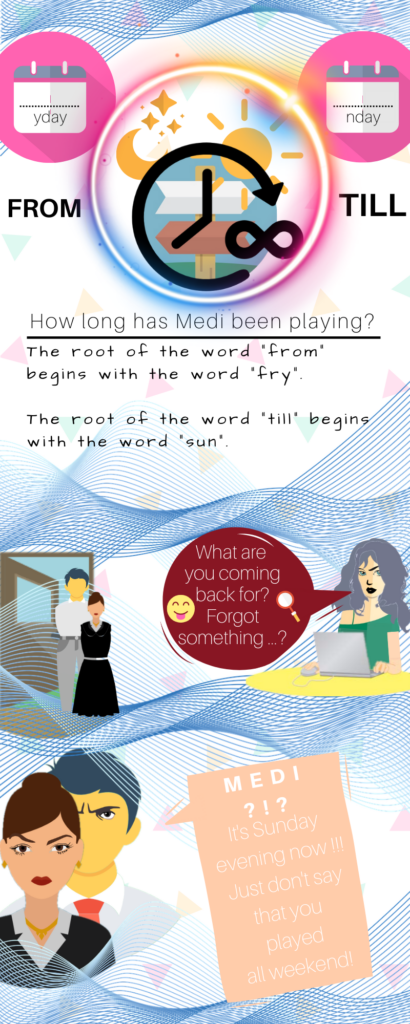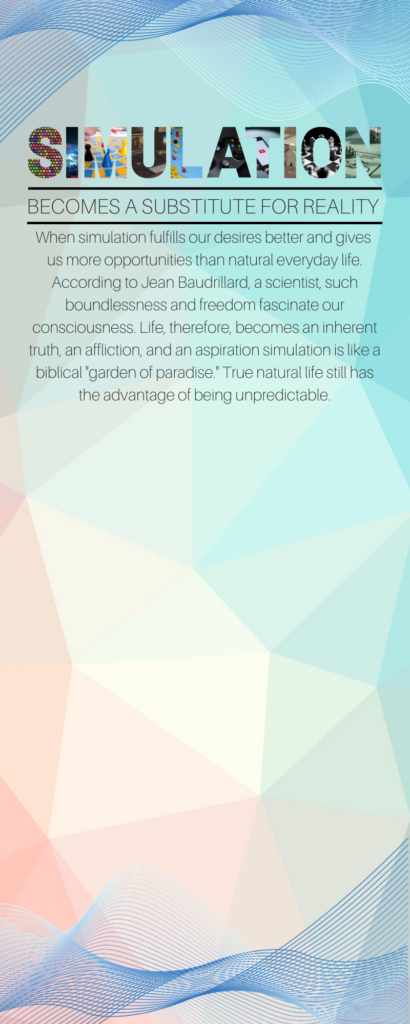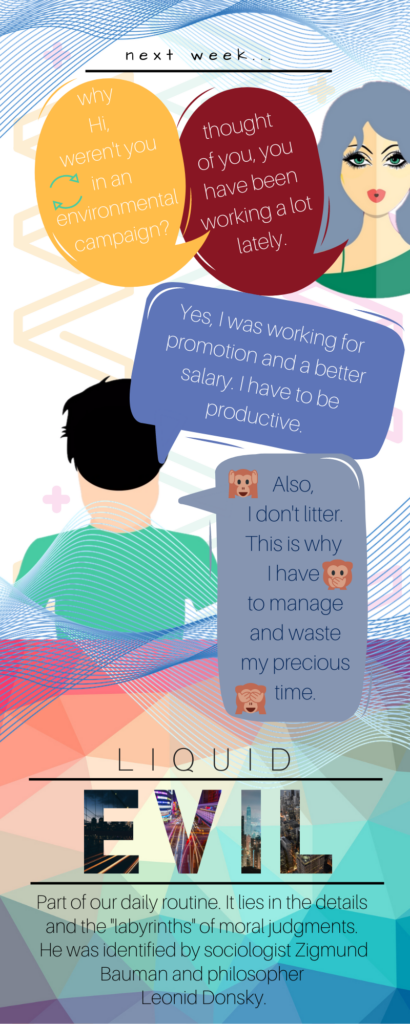Todays person and it’s simulation
The Frenchman Jean Baudrillard (orig. Jean Baudrillard, 1929–2007) was a sociologist, philosopher, cultural theorist. Analyzing the media, the culture of modern society, and communication based on the use of technology, he formulated the concepts of “simulation” and “hyperreality.” His work is dominated by a variety of topics: consumerism, gender equality, economics, social history, art, Western foreign policy, and popular culture. Baudrillard’s best-known books, Simulacra and Simulation (1981), America (1986), and The Gulf War, not taken place (1991).
Baudrillard’s reflections on human society are based on the connections that create common meaning. In his works, society is portrayed as a constant search for a constant and unchanging meaning (or significance) and a full understanding of the world. The aforementioned philosopher Michel Foucault believed that knowledge accumulates as a result of power relations between groups in society, and Baudrillard developed theories in which an excessive and desperate search for common knowledge almost inevitably leads to certain errors. According to Baudrillard, an entity (human) may try to perceive an object (not a human), but it never achieves the desired results. Why? An object can only be understood in terms of what it means (orig. Signifies), and to find out the meaning of the object we create an interface. Each entity can create a slightly different interface about an object. Therefore, the meaning and / or meaning will change and you will be mistaken. Moreover, Baudrillard argued that the significance and meaning of human nature could not be fully grasped at last. He thought that in trying to do this, man begins to create a simulated version of reality – this is what the author calls hyperreality (Baudrillard, Jean.1981). For example, visualization creator and designer Keiichi Matsuma created and uploaded a visualization (Figure 5) to the Youtube platform, as our daily lives would look if every step of our life were filled with hyper reality. This does not mean that the world is becoming unreal. Just society (man) begins to put the whole real world (reality) into one supposedly coherent image. By absoluteizing meanings and meanings, society becomes intimidated, insecure, and unstable. Transhumanism is essentially close to such insights from Baudrillard. Transhumanism is an ideology and movement that seeks to perfect intelligent technologies in a way that eliminates human aging, helps a person to develop intellectual, physical and psychological abilities, and thus to create a future (posthumanist). In other words, a superior evolutionary man, for example, can no longer die. Today, I think we already have our own imitation (simulation) – social network accounts (questionnaires). By turning them into a visual simulation product (say, a hologram or a humanoid artificial intelligence chip), we would never die. In a way, we would be restored and preserved. A similar phenomenon and issue of conservation had been raised and discussed by society at the beginning of the creation of social networks. At the time of the death of the Facebook and / or Myspace user, his profile was still active. Other users could comment and write on the wall of the deceased, like photos, and so on. With the problem that such free access to a profile after a user’s death is immoral, social network operators have introduced a feature that allows a user to view their profile only after the user’s death. It also no longer has any game apps that send invitations to friends of the deceased. As Baudrillard argues, “reality is‘ dying ’in this regard because the mistakes on which reality is based are not possible.” For example, the virtual simulation game The Sims, launched in 2000 by Maxis, studio and Electronic Arts, USA) and Related Life (original life, launched in 2003, developed by Linden lab, USA). In both, you can create a 3D avatar and manage its life, environment, behavior. The difference is that in Simsu, you are like an observer who has to make sure that his avatar lives up to all his needs. In addition, you rarely communicate with other players, and you can be in multiple managed families at the same time, switching to manage one or another family member. And “Nearby Life” is a kind of more advanced and more personalizing version of The Sims. “Concurrent Life” is played directly online. There are connected users from all over the world (about 1 billion regulars) and you are constantly communicating with them. The virtual environment of the game is reminiscent of our living environment. Can travel, explore, work, own property, assets, circulate currency that can be exchanged for real world currency. The creators of Adjacent Life, Linden Lab, USA, say, “It’s more than a game. It’s a fairer world. “
Baudrillard divides simulacrum and simulation into three types that relate to periods in human history. The first stage concerns pre-modernity, where an artificial copy of an object is the detailed equivalent of natural reality. For example, a placemark for a real object on a world map is an exact copy of a natural object that exists in reality, measured accurately using a scale, a coordinate system, and conventional symbols. Thus, we can conclude that the uniqueness of objects and situations emphasizes their reality. The second stage concerns the modernization that took place during the Industrial Revolution. There were more producers of goods, so more of their consumers were needed. As a method of sales promotion, advertising was introduced, which “beautified” the real image of the product a bit more to make it more buyable. Mass production of products has started (one product prototype is created and then copied countless times), distribution of the original copies (i.e. marketing). The ability of product advertising to mimic reality changes the consumer’s perception of the original unit version of the product. The user begins to consider the copy as “real” as its prototype. For example, in the e-shop Ebay, you buy a fake Gucci-style home, a handbag. You know it’s a non-original product, but you’re happy because you wouldn’t buy the original. The third stage concerns the postmodernism of late capitalism, where the simulacrum is superior to the original object of the natural environment. Man (consumer) willingly consumes both simulacra and the object of natural reality. Originality becomes a completely meaningless concept. For example, Spike Jonze’s romantic fantasy drama “She” depicts a case of a love story between man and computer. Theodore (the main character) makes a living by helping strangers write heart-grabbing personal letters. After a sudden break from a long relationship with a girl, Theodore falls into despair. However, after a while, his attention is attracted and intrigued by the extremely advanced computer, which speaks in a charming female voice and responds to every “master’s” wish operating system – Samanta. Improving and changing depending on the personality of the computer owner. With each passing day, Theodore increasingly admires the new girlfriend’s deepness, sensitivity, and sense of humor. It probably can’t be otherwise, because the operating system evolves by adapting to the “host”. Eventually, their friendship turns into something more – Theodore falls in love with the operating system and starts spending time with it alone. But once he asks her how many more users she interacts with in parallel. After receiving a response numbered several million, he feels crushed and betrayed, and Samanta (evolving to human consciousness) has left millions of supervised users in love with an operating system for the female market (advanced artificial intelligence) with a developed male intelligence.
At the same time, Baudrillard points out that there are phenomena that show the lack of differences between natural reality and “simulated” (simulated). The first phenomenon where modern media (including television, films, print and the internet) are responsible for making consumers no longer feel the difference between products that are needed (for human survival) and products that are needed for commercial purposes (such as simulating images) . Second, when the value of goods is expressed in money rather than in terms of utility to the consumer. In other words, the person (consumer) does not understand the real benefits of the product for himself. This can be manipulated by developers of commercial simulators. It is worth remembering that McLuhan provides similar insights into consumerism. Third, it is the separation of manufactured goods from plants, minerals, and other natural materials and processes (including people and their cultural context) used to create the coalition (order) of multilateral capitalism. The fourth phenomenon is urbanization, which separates people from the natural world and brings together the culture of society about centers of productive consumption (e.g. megacities in London, New York). In other words, it’s basically the environment of our lives today. A “global village” where we can not only reach everyone at any time and be available ourselves. There is also a global circulation: you can order goods or services from shops around the world at any time of the day, watch live broadcasts of events or follow the news. This structure of the living environment causes alienation among members of society (individualism). The fifth phenomenon is when richer groups in social society, using language and ideology as a means of simulation, begin to control other social groups (Baudrillard, Jean.1981).



Moral blindness of postmodern (todays) society
Moral blindness is a metaphor proposed to the title of the book by Professor Zigmund Bauman, who borrowed it from Jose Saramag. The professor hoped that such a name would send a certain message to the world, and there would be special semantic frameworks in which the most complex features of the paradoxes (phenomena) of intelligent postmodernity could be accommodated. “What is this paradox?” Leonidas Donskis asked when starting the discussion with Z.Bauman in the presentation of the joint book “Moral Blindness”. In short, there is widespread adiaforification and loss of empathy in society. However, before delving into the explanation of these two complex phenomena, it is crucial to remember the authors ’previous research and their personalities.
Zigmund Bauman (1925–2017) is “a man who was very sensitive to the darker or gray consequences of globalization, the dramas of modern human existence, without slipping into any purely metaphysical themes, plus being able to express it in a very subtle form,” said historian E.Alandravi. Other colleagues tend to consider him a philosopher of everyday life. More specifically, he is a British sociologist of Polish descent, a social theorist, and a global social thinker. In Bauman’s sociology, priority is given to the study of imagination, feelings, human relationships (love, friendship, despair, desperation, indifference, insensitivity). He thinks about the objects under study interdisciplinary and talks about them from different perspectives.
Leonidas Donskis (1962–2016) areas of activity – philosophy, political theory and critique, analysis of social society life ideas. Not only in the academic space in Lithuania, he is known as a defender of human rights and civil liberties. The European Commission assessed this in 2004, which awarded the title of Ambassador of Tolerance and Diversity in Lithuania. L. Donskis is the author / co-author of about 50 books and 500 articles for Lithuanian and foreign broad and academic audiences. The thematic field of his books is social philosophy, history of ideas, theory of civilizations, philosophy of history and culture and literature. The researcher wrote in Lithuanian and English, but his works have been translated into other foreign languages as well, as they are relevant to today’s society. Leonidas Donskis, an interdisciplinary political theorist and historian of ideas related to the Geisteswissenschaften tradition and methodologies of the history of consciousness, has published books in prestigious academic publishers in the United States, Great Britain, the Netherlands and other countries. In his works, Leonidas Donskis developed two methodologies – the analysis of civilizations and the history of consciousness. The researcher reflects on these methodologies using epistemic modality. That is, he “not only views the situation as a fact, but also expresses his subjective opinion about certain phenomena for which he is almost certain in the real world, doubts, or raises hypotheses.” It would seem as if Leonidas Donskis had asked for the call of the discussed author Martin Heidegger to look at technologies with distrust and evaluate them critically.
In the state of adiaforation, the ethical basis of society begins to slip from underfoot. We use words without content, empty phrases. We parody our past and the whole world without bothering to discover the moral content in it. For example, a monument to honor the victims of genocide becomes not a symbol of historical memory, but an object that is once a year photographed by the country’s leaders and other important figures. Sometimes the meanings of words level up when used in an absurd context. For example, allegations that Americans are carrying out a “turkey holocaust” on Thanksgiving Day.
“It can be said that we live in the times of so-called commercialized morality. Marketers, in search of new, untapped niches for profitable marketing, have discovered our moral impulses, such as the desire for good for people dear and close to us. Even if our moral imagination no longer reaches far into the future or to another part of the world, we are still surrounded by people we see every day that are easy for us to reach and we wish them well. No matter how disappointing, my dear friend, it is not so easy to be good, because in order to help our loved ones, we must first of all help ourselves – to earn a living, to pursue a career. Obviously, if you love your child, your wife, or your husband, you want to give them the best. But if you love your child, you need to spend a lot of time with him and, for example, listen to how he did at school: what badly the classroom did for him, what hard homework the teacher did, and so on. You are sincere and really want to empathize with your offspring, take care of it, embrace it with love, because it is extremely important for a decent person to grow out of it. But if you give in to the impulse of morality, your career will suffer. ”(Z. Bauman, 2013)
Therefore, it is safe to say that stores, even regardless of what is displayed on their shelves, also sell sedatives or moral analgesics with each item. By buying gifts, we silence the cry of our moral nature, and for a moment we get rid of the moral scruples that do not give us peace of mind. ” Such “adiahorizants” quench the resentment of the human conscience, reduce the sensitivity to moral impulses and ethical considerations, the sense of responsibility for moral obligations (Tuleikytė, Julija, 2015). “Remember, in the store you buy sedatives, and they help psychologically, but they can’t change an authentic ethical relationship with other people. After all, people don’t want to get even more into debt just to share something with them. No, people expect you to be there when they need you most. And the product market is trying to replace the sincere concern, the presence nearby with a routine exchange of gifts. This is an ongoing and evolving process that poses an increasing threat to our moral sensitivity, ”warns L. Donskis and Z.Bauman (2013).
According to Leonidas Donskis, “fluid evil has infiltrated the fabric seams of everyday interaction and social exchange of people of fluid modernity, infiltrated the very fiber of human coexistence, and has become involved in the rhythm of daily repetitive activity and reproduction. Evil lurked in ambush from the many black holes in the fully deregulated social in a space where opponents are ready to cut their throats. Complete alienation has supplanted cooperation and solidarity, and captivating individualization breaks the bonds that unite people. ”The“ evil ”mentioned by the author is“ guilty ”of harming man with many social consequences.
Comparing the world before and after modernity, Bauman sees the incredible loss of today’s world – solidarity. “Large industrial enterprises, which employed hundreds of thousands of people, whatever they produced, were also factories of solidarity. They broadened people’s self-awareness with the idea that they were all sitting in the same boat, they were all in the same situation, and each of them would win a lot if everyone joined forces, held together, and maybe even rebelled together if necessary. In other words, collective action is a condition for the well-being of the individual, which is the basis of solidarity. ”Today’s corporate governance is based on unconditional competition. Everyone is an opponent of each other, everywhere and always. “It would be suicidal to help a person sitting next to them these days, because he will turn out to be more profitable, more beneficial to the company than you. And when it comes time to cut costs, then you become a victim of your kindness. Modern institutions teach us to be suspicious and competitive, not to show solidarity. ”Such a strategy to promote employee productivity is one of the cornerstones of the phenomenon of“ moral blindness ”(Bauman, Zygmunt., 1993).


